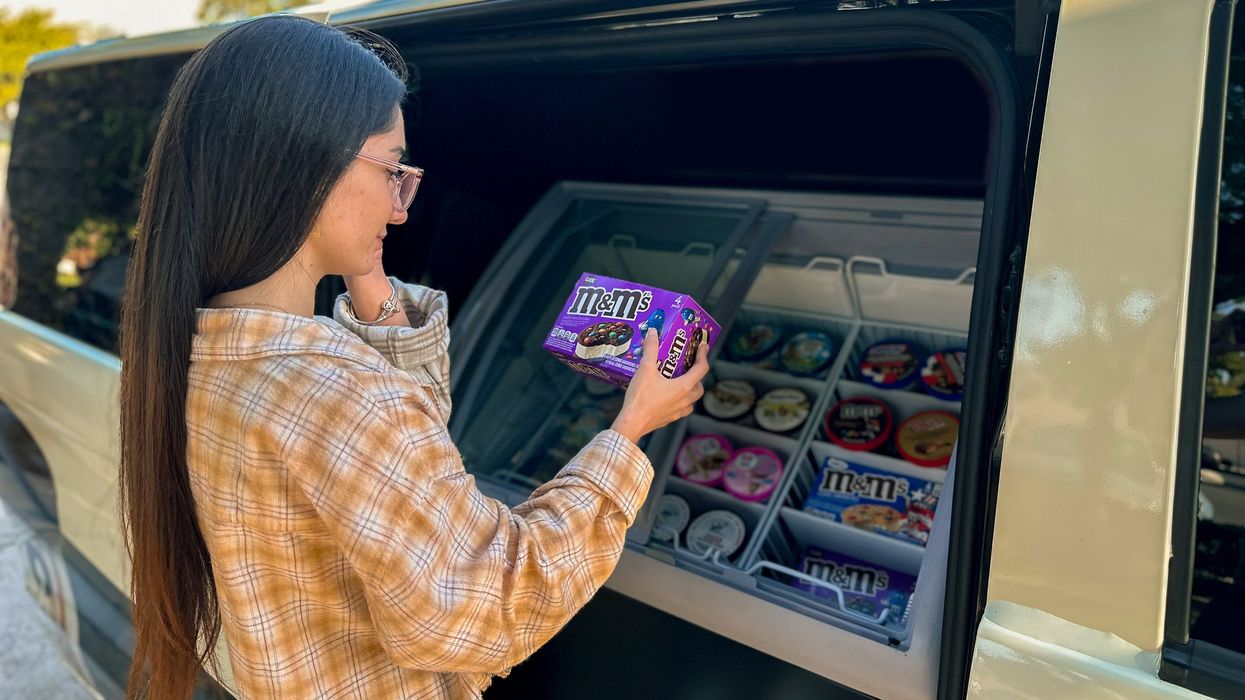Brand News
08 March 2023
Mars pilots on-demand ice cream delivery – from a mobile store
The CPG is partnering with Conjure to launch a direct-to-consumer service in Hollywood.

Grabbing M&Ms ice cream sandwiches. (Courtesy photo)
The CPG is partnering with Conjure to launch a direct-to-consumer service in Hollywood.

Grabbing M&Ms ice cream sandwiches. (Courtesy photo)
If a new pilot between a CPG leader and a tech company proves to have wings, the Ice cream store will soon come to customers.
The news: Mars, Incorporated is partnering with Conjure to launch delivery of ice cream from on-demand mobile stores. Initially, the store-hailing service will roll out in Hollywood, California, this spring.
How it works:
Through one-tap ordering on a mobile app, customers can hail a mobile shop, which is a van stocked with ice cream. Available products will include ice cream pints such as M&Ms Chocolate, Snickers and Twix, as well as Snickers and Twix ice cream bars.
Shops arrive in as little as two minutes.
When the shop arrives, customers can pick out their order. The system is checkout-free, so customers simply walk away with ice cream in hand.
Key quotefrom Jerome Morgen, senior global director of Mars Unattended Retail: "Mars is continuously investing in driving innovation for the treats and snacks category through the unattended retail space, giving consumers more opportunity to shop our products with speed and convenience. This partnership with Conjure helps solve the industry's biggest issue – ice cream melting before reaching the home when purchased in store or through other delivery methods."
The new ice cream truck: This is the second notable partnership in a year for Conjure, which was formerly known as Robomart. It also signed on with Unilever to deliver products such as Ben & Jerry’s and Good Humor in another Southern California pilot. The company’s on-demand ordering system puts a new twist on the classic ice cream truck. Instead of music, an app can signal that a store is on its way. Under the hood, it's designed to solve a pair of challenges for brands and retailers. Conjure's service stands to increase efficiency in delivery, while also allowing customers to access ice cream quickly, when they want it.
"We are thrilled to partner with Mars to expand our offering to consumers through our on-demand mobile ice cream stores," said Ali Ahmed, CEO of Conjure, in a statement. "Mars' ice cream brands are the perfect addition to our platform, and we believe this partnership will be a game-changer in the ice cream industry."
Campbell Soup Company CEO Mark Clouse offered thoughts on messaging amid inflationary shifts in consumer behavior.
After months of elevated inflation and interest rate hikes that have the potential to cool demand, consumers are showing more signs of shifting behavior.
It’s showing up in retail sales data, but there’s also evidence in the observations of the brands responsible for grocery store staples.
The latest example came this week from Campbell Soup Company. CEO Mark Clouse told analysts that the consumer continues to be “resilient” despite continued price increases on food, but found that “consumers are beginning to feel that pressure” as time goes on.
This shows up in the categories they are buying. Overall, Clouse said Campbell sees a shift toward shelf-stable items, and away from more expensive prepared foods.
There is also change in when they make purchases. People are buying more at the beginning of the month. That’s because they are stretching paychecks as long as possible.
These shifts change how the company is communicating with consumers.
Clouse said the changes in behavior are an opportunity to “focus on value within our messaging without necessarily having to chase pricing all the way down.”
“No question that it's important that we protect affordability and that we make that relevant in the categories that we're in," Clouse said. "But I also think there's a lot of ways to frame value in different ways, right?”
A meal cooked with condensed soup may be cheaper than picking up a frozen item or ordering out. Consumers just need a reminder. Even within Campbell’s own portfolio, the company can elevate brands that have more value now, even if they may not always get the limelight.
The open question is whether the shift in behavior will begin to show up in the results of the companies that have raised prices. Campbell’s overall net sales grew 5% for the quarter ended April 30, while gross profit margins held steady around 30%. But the category-level results were more uneven. U.S. soup sales declined 11%, though the company said that was owed to comparisons with the quarter when supply chains reopened a year ago and expressed confidence that the category is seeing a longer-term resurgence as more people cook at home following the pandemic. Snacks, which includes Goldfish and Pepperidge Farm, were up 12% And while net sales increased overall, the amount of products people are buying is declining. Volumes were down 7%.
These are trends happening across the grocery store. Campbell is continuing to compete. It is leading with iconic brands, and a host of different ways to consume them. It is following that up with innovation that makes the products stand out. Then, it is driving home messaging that shows consumers how to fit the products into their lives, and even their tightening spending plans.
Campbell Soup is more than 150 years old, and has seen plenty of difficult economic environments. It is also a different business today, and will continue to evolve. At the end of the day, continued execution is what’s required.
“If it's good food, people are going to buy it, especially if it's a great value,” Clouse said.